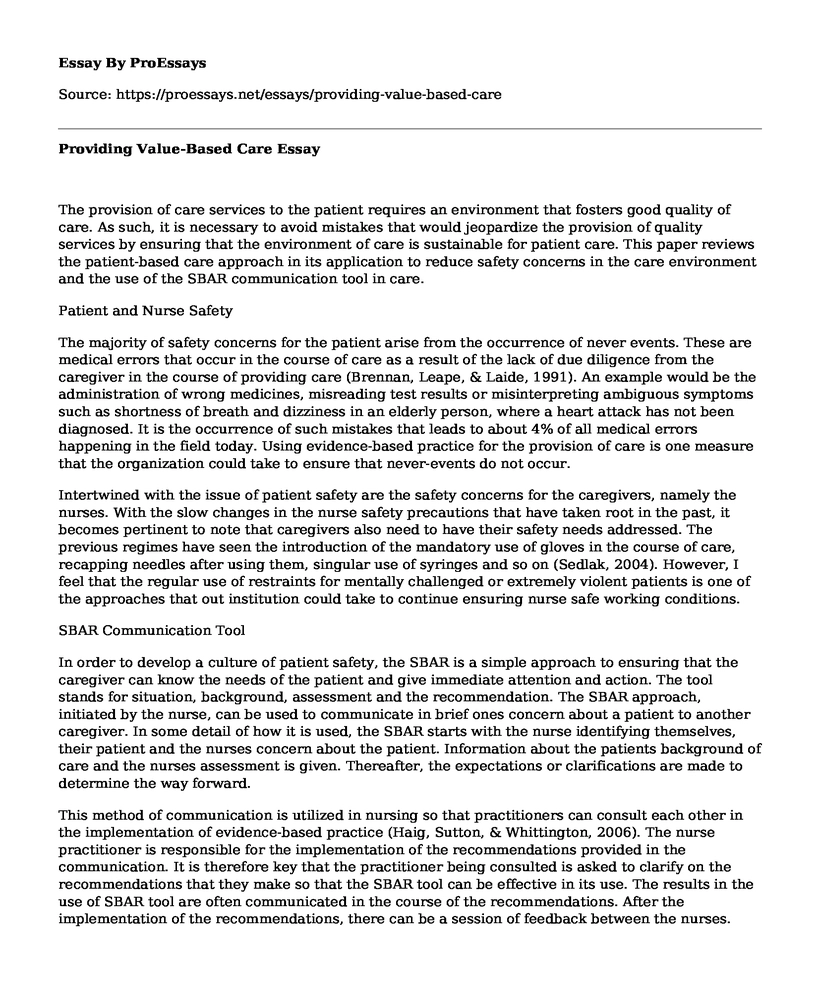The provision of care services to the patient requires an environment that fosters good quality of care. As such, it is necessary to avoid mistakes that would jeopardize the provision of quality services by ensuring that the environment of care is sustainable for patient care. This paper reviews the patient-based care approach in its application to reduce safety concerns in the care environment and the use of the SBAR communication tool in care.
Patient and Nurse Safety
The majority of safety concerns for the patient arise from the occurrence of never events. These are medical errors that occur in the course of care as a result of the lack of due diligence from the caregiver in the course of providing care (Brennan, Leape, & Laide, 1991). An example would be the administration of wrong medicines, misreading test results or misinterpreting ambiguous symptoms such as shortness of breath and dizziness in an elderly person, where a heart attack has not been diagnosed. It is the occurrence of such mistakes that leads to about 4% of all medical errors happening in the field today. Using evidence-based practice for the provision of care is one measure that the organization could take to ensure that never-events do not occur.
Intertwined with the issue of patient safety are the safety concerns for the caregivers, namely the nurses. With the slow changes in the nurse safety precautions that have taken root in the past, it becomes pertinent to note that caregivers also need to have their safety needs addressed. The previous regimes have seen the introduction of the mandatory use of gloves in the course of care, recapping needles after using them, singular use of syringes and so on (Sedlak, 2004). However, I feel that the regular use of restraints for mentally challenged or extremely violent patients is one of the approaches that out institution could take to continue ensuring nurse safe working conditions.
SBAR Communication Tool
In order to develop a culture of patient safety, the SBAR is a simple approach to ensuring that the caregiver can know the needs of the patient and give immediate attention and action. The tool stands for situation, background, assessment and the recommendation. The SBAR approach, initiated by the nurse, can be used to communicate in brief ones concern about a patient to another caregiver. In some detail of how it is used, the SBAR starts with the nurse identifying themselves, their patient and the nurses concern about the patient. Information about the patients background of care and the nurses assessment is given. Thereafter, the expectations or clarifications are made to determine the way forward.
This method of communication is utilized in nursing so that practitioners can consult each other in the implementation of evidence-based practice (Haig, Sutton, & Whittington, 2006). The nurse practitioner is responsible for the implementation of the recommendations provided in the communication. It is therefore key that the practitioner being consulted is asked to clarify on the recommendations that they make so that the SBAR tool can be effective in its use. The results in the use of SBAR tool are often communicated in the course of the recommendations. After the implementation of the recommendations, there can be a session of feedback between the nurses. This has resulted in the improvement of inter-professional interactions in the course of care (Velji, et al., 2008).
Evidence based practices have been used in the implementation of changes in organizations. The physician will thus access research on a clinical question, patient preferences and their expertise on a subject before implementing such a change (Sackett, Strauss, Richardson, Rosenberg, & Haynes, 2000). There are now many practices in place backed up by evidence for example the early ambulation to prevent pneumonia after surgery, the quality of life practices for patients with chronic pain, the use of gloves for simple dressing procedures, practices in orthopedic pain care and the different reliability for methods of naso-gastric tube placements (Beyyea & Blattery, 2010).
Conclusion
Value-based care thus includes a combination of different methods for the achievement of quality of care goals. These are the goals envisioned in the various communication practices viewed above, and the application of evidence-based practices in the course of care.
References
Beyyea, S., & Blattery, F. (2010). Evidence-based Practice in Nursing: a guide to successful implementation. Retrieved March 29, 2016, from hcmarketplace.com: http://www.hcmarketplace.com/supplemental/3737_browse.pdf.
Brennan, T., Leape, L., & Laide, N. (1991). Incidence of adverse events and negligence in hospitalized patients: Results of the Harvard Medical Practice Study I. New England Journal of Medicine, 370-76.
Haig, K., Sutton, S., & Whittington, J. (2006). SBAR: a shared mental model for improving communication between clinicians. The joint commission journal on quality and patient safety, 167-75.
Sackett, D., Strauss, S., Richardson, S., Rosenberg, M., & Haynes, B. (2000). Evidence-Based Medicine: How to Practice and Teach EBM. London, UK: BMJ Books.
Sedlak, C. (2004). Overview: Nurse Safety: Have We Addressed the Risks? The Online Journal of Issues in Nursing, Available: www.nursingworld.org/MainMenuCategories/ANAMarketplace/ANAPeriodicals/OJIN/TableofContents/Volume92004/No3Sept04/NurseSafetyOverview.aspx.
Velji, K., Baker, G. R., Fancott, C., Andreoli, A., Boaro, N., Tardif, G., et al. (2008). Effectiveness of an adapted SBAR communication tool for a rehabilitation setting. Healthcare Quarterly, 11Sp.
Cite this page
Providing Value-Based Care. (2021, Mar 12). Retrieved from https://proessays.net/essays/providing-value-based-care
If you are the original author of this essay and no longer wish to have it published on the ProEssays website, please click below to request its removal:
- A Statement of the Issues Being Researched - Health Care Ethics
- Why Steroids Hinder an Athlete's Performance Essay
- Research Paper on Health and Mental Health Integration in Social Work
- Is Addiction A Disease or A Choice? - Essay Sample
- Emergency Management Article Review
- Heroin Exposure in Pregnancy: Epidemiology, Triangle, and Community Health - Essay Sample
- Cholera: A Waterborne Disease & Its Seasonal Patterns - Essay Sample







